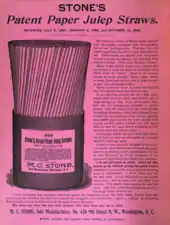Marvin Stone
Marvin Chester Stone (April 4, 1842 – May 17, 1899)[1] was an American inventor. He is best known for inventing the modern drinking straw.

Early life
Stone was born in Portage County, Ohio in 1842. The son of an inventor, Stone made many useful articles in his boyhood. He was a graduate of Oberlin College, although his course of study was interrupted by his service in the Civil War.[2] During the Civil War, Stone served in the 7th Ohio Regiment.[3] He was injured in the Battle of Lookout Mountain, and sent to Washington D.C. on special duty with the Veteran Reserve Corps.[3]
After college, Stone began a theological course, but abandoned it to go to Washington, D.C. where he was employed as a newspaper correspondent for several years.[2]
Career

Stone began his career as an inventor by creating a machine to make paper cigarette holders. Stone secured a contract with the W. Duke Sons & Co. and opened a factory in Washington, D.C.[4] to produce cigarette holders for the company's Cameo brand of cigarettes.[5]
Later, Stone developed the modern drinking straw.[2] Prior to Stone's invention, people used natural rye grass straws, which imparted an undesirable grassy flavor in beverages.[6] To combat the problem, Stone made the first drinking straw prototypes by spiraling a strip of paper around a pencil and gluing it at the ends.[7] Next he experimented with paraffin wax-coated manila paper, so that the straw would not get soggy when used. Stone's straws were 8 1/2 inches long[8] and had a diameter just wide enough to prevent things like fruit pips from getting lodged in the tube.[9]
Stone received the patent of the "artificial straw" on January 3, 1888. It was made out of paper.[9][10] By 1890, Stone's factory was producing more drinking straws than cigarette holders.[7]
Stone invented a number of other items during his career, including a kind of fountain pen[3] and an umbrella.[11]
Later life and death
Stone used the newfound wealth from his straw business for a variety of philanthropic causes.[9] He furnished lodging for his female employees, including a large library, music room, meeting room, and dancing floor.[2] In addition, he and several others built two blocks of tenement houses for African American residents of Washington, D.C.[9]
Stone died in his home in Columbia Road, Washington, D.C., on May 17, 1899 after a long illness.[2] He was survived by his wife, Jane "Jennie" Platt.[10] Stone is buried at Green Mount Cemetery in Baltimore, Maryland.[12]
References
- Wilson, Lawrence (1907). Itinerary of the Seventh Ohio Volunteer Infantry, 1861-1864: With Roster, Portraits and Biographies. New York and Washington: Neale Publishing Company. pp. 440–441.
- "Obituary, Marvin Chester Stone". Home Furnishing Review, Volume 15. 1899: 323. Cite journal requires
|journal=(help) - "Death of Marvin C. Stone". Evening Star. Washington, D.C. May 18, 1899. Retrieved July 23, 2018.
- "Untitled Article". Washington, D.C.: National Republican. September 11, 1886. Retrieved July 23, 2018.
- "A Cigarette Holder Factory". The Weekly Sentinel (Winston-Salem, N.C.). October 21, 1886. Retrieved July 23, 2018.
- Thompson, Derek (November 22, 2011). "The Amazing History and the Strange Invention of the Bendy Straw". The Atlantic.
- Broda-Bahm, Chris. "The Straight Truth About the Flexible Drinking Straw". Smithsonian Museum of American History, Lemelson Center for the Study of Invention and Innovation. Cite magazine requires
|magazine=(help) - Madrigal, Alexis (June 21, 2018). "Disposable America". The Atlantic.
- Bisset, Colin (September 30, 2013). "How the drinking straw created a fairer America". Australian Broadcasting Corporation.
- "What Once Was Washington DC, Center of Manufacturing". TheInTowner. July 18, 2015. Retrieved August 8, 2018.
- "Patents Issued". Washington, D.C.: Evening Star. January 1, 1884. Retrieved July 23, 2018.
- "Marvin Chester Stone". Find a Grave. Retrieved August 8, 2018. Memorial ID 35496022.